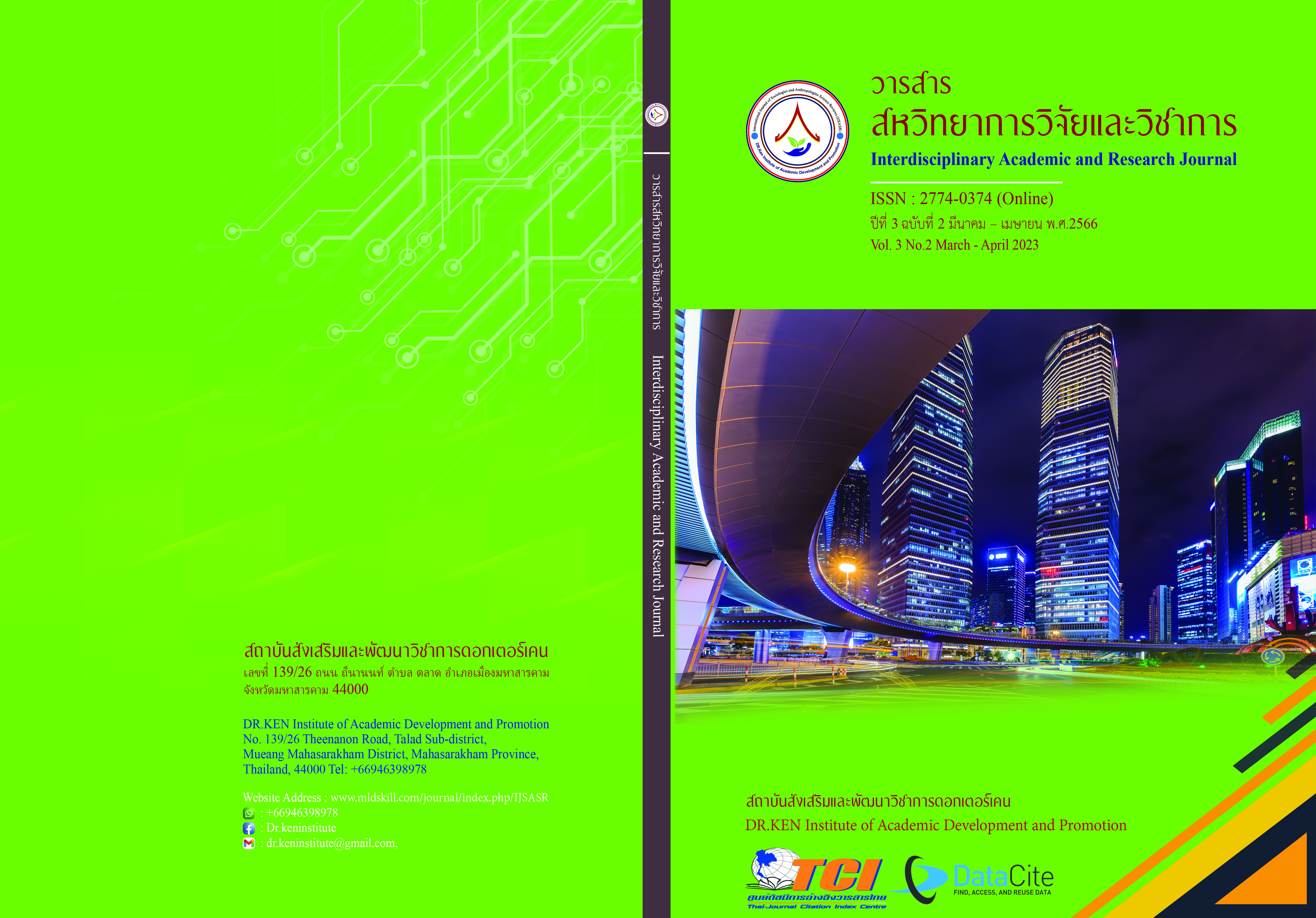Community-Based Tourism for the Sustainable Development
DOI:
https://doi.org/10.14456/iarj.2023.106Keywords:
Tourism Management;, Sustainable DevelopmentAbstract
Community-based tourism is an alternative type of tourism and is one of the trends in local tourism that is gaining popularity among tourists who prefer a new lifestyle. As it is a matter of contact between visitors and homeowners, especially in rural areas. Tourists get to travel in the area and learn about the lifestyle and culture of the local people, allowing them to see our local character. Thus, If there is more tourism like this, it will open up an opportunity for creative changes in the locality. This article presents the concept of community-based tourism management toward sustainable development. This is tourism that encourages people in the community to participate in planning. Make decisions and develop your community. To increase the well-being of people in the community both economically. society and environment. The guidelines for managing community-based tourism for sustainable development are; (1) the community must manage tourism to meet the standards of world sustainable tourism. Including creating a distinctive community identity and maintaining the local community. (2) The community must organize a variety of tourism programs. and public relations for community tourism linking with nearby tourist attractions (3) community leaders and committees must encourage people to participate in public activities of the community and (4) community leaders or tourism management committees should create networks within the community and outside the community.
References
กระทรวงการท่องเที่ยวและกีฬา. (2562). แถลงข่าวสถานการณ์การท่องเที่ยวระหว่างประเทศไทย ปี พ.ศ. 2561 (28 ม.ค. 2562). Retrieved May 15, 2019, from: https://www.mots.go.th/more_news.php?cid=499&filename=index
โตมร ศุขปรีชา. (2559). Localism & Staycation ที่สุดของการเที่ยว. TAT Tourism Journal จุลสารวิชาการท่องเที่ยว. 2(3), 21-27.
พิมพ์ระวี โรจน์รุ่งสัตย์. (2556). การท่องเที่ยวชุมชน. พิมพ์ครั้งที่ 2. กรุงเทพฯ : โอเดียนสโตร์.
พิมพ์ลภัส พงศกรรังศิลป์. (2547). ภาพลักษณ์ด้านการท่องเที่ยวของจังหวัดนครศรีธรรมราชในมุมมองของนักท่องเทียว. รายงานการวิจัย. สถาบันวิจัยและพัฒนา มหาวิทยาลัยวลัยลักษณ์.
ยุทธศักดิ์ สุภสร. (2563). การนำเสนอทิศทางการส่งเสริมการท่องเที่ยวของ ททท. ปี 2563. TAT Tourism Journal จุลสารวิชาการท่องเที่ยว. 5(4): 14-21. กรุงเทพฯ : การท่องเที่ยวแห่งประเทศไทย.
วีรพล ทองมา. (2560). การท่องเที่ยวโดยชุมชนสำหรับการพัฒนาคุณภาพชีวิตของชุมชนในเขตที่ดินป่าไม้. เชียงใหม่: มหาวิทยาลัยแม่โจ้.
สถาบันการท่องเที่ยวโดยชุมชน. (2559). การจัดการท่องเที่ยวโดยชุมชน. Retrieved September 1, 2019, from: http://www.cbt-i.or.th
สมบัติ กาญจนกิจ. (2557). นันทนาการและอุตสาหกรรมการท่องเที่ยว. พิมพ์ครั้งที่ 2. กรุงเทพฯ: จุฬาลงกรณ์มหาวิทยาลัย.
สำนักงานปลัดกระทรวงมหาดไทย. (2551). การบริหารและการจัดการท่องเที่ยว. กรุงเทพฯ : กระทรวงมหาดไทย.
สินธุ์ สโรบล, อุดร วงศ์ทับทิม และสุภาวณี ทรงพรวาณิชย์. (2546). การท่องเที่ยวโดยชุมชน : แนวคิดและประสบการณ์. เชียงใหม่ : มิ่งเมืองนวรัตน์.
สินธุ์ สโรบล. (2551). การจัดการท่องเที่ยวโดยชุมชน. ประชาคมวิจัย. 57, 15-21.
สุดถนอม ตังเจริญ. (2559). การจัดการท่องเที่ยวโดยชุมชนกับการพัฒนาการท่องเที่ยวอย่างยั่งยืนของชุมชนบางขันแตก จังหวัดสมุทรสงคราม. วารสารวิชาการการท่องเที่ยวไทยนานาชาติ. 13(2), 1-24.
องค์การบริหารและพัฒนาพื้นที่พิเศษเพื่อการท่องเที่ยวอย่างยั่งยืน (องค์การมหาชน). (2559). เกณฑ์การพัฒนาการท่องเที่ยวโดยชุมชนของประเทศไทย. กรุงเทพฯ: อ.พ.ท.
อัญชลี ศรีเกตุ และปิยะนุช เงินคล้าย. (2564). การจัดการท่องเที่ยวโดยชุมชนในภาคตะวันออกของประเทศไทย. วิทยานิพนธ์ปริญญาดุษฎีบัณฑิต, มหาวิทยาลัยรามคำแหง.
อุษาวดี พลพิพัฒน์. (2545). การท่องเที่ยวแบบยั่งยืน : กรณีศึกษาการท่องเที่ยวเชิงนิเวศโดยชุมชนในประเทศไทย. จุลสารการท่องเที่ยว. 21(4), 38-48.
Adhikary, Mc.Kinsey. (1995). Management of Ecotourism, Ecotourism: Concept, Design, and Strategy. Bangkok : Srinakharinwirot.
Asker, S., Boronyak, L., Carrard, N., & Paddon, M. (2010). Effective community-based tourism. A best practice manual. APEC tourism working group. Journal of Management, 17(1), 99-120.
Dowling, R. K. (1995). Ecotourism development: regional planning and strategies. A paper presented at the International Conference on Ecotourism: Concept, Design, and Strategy. February 6-8, 1995. Bangkok, Thailand.
Fannell A. David, (1999). Ecotourism: An introduction. London: Routledge.
Goeldner, C. R., & Ritchie, J. R. B. (2006). Tourism: Principles, practices, philosophies. 10th edition. New York: John Wiley & Sons.
Goodwin, H and Santilli, R. (2009). Community-based tourism: A success? ICRT Occasional Paper 11. Retrieved September 10, 2020, from http://www.icrtourism.org/documents/OP11merged.pdf
Mintzberg, H. (2009). Rebuilding companies as communities. Harvard Business Review. 87(July-August), 140-143.
Shirley, Eber. (1993). Beyond the Green Horizon: Principles for Sustainable Tourism. UK: Heinemann.The Global Sustainable Tourism Council [GSTC]. (2011). Annual report 2010. Retrieved April 2, 2019, from http://www.gstcouncil.org/images/stories /SupportDocs/Document/GSTC_Annual_Report_Final.pdf.
Tourism Western Australia. (2009). Five A’s of tourism. Retrieved from http://www.tourism.wa.gov.au/jumpstartguide/pdf/Quickstart_five%20A's%20of%20Tourism LOW.pdf
United Nations World Tourism Organization [UNWTO]. (2005). Sustainable development of tourism. Retrieved April 2, 2019, from http://sdt.unwto.org/en/content/ about-us-d.
World Bank. (2000). Environment Matters An Annual Review of the Bank’s Environmental Work. London: University of Bath.
World Tourism Organization. (2004). Indicators of Sustainable Development for Tourism Destinations A Guidebook (English version). Retired 10 May 2020, from https://www.e-unwto.org/doi/book/10.18111/9789284407262.
World Tourism Organization. (2016). Tourism, a factor of sustainable development. World Tourism Organization. Retrieved August 15, 2019, from: http://ethics.unwto.org/en/content/global-codeethics-tourism-article-3
Downloads
Published
How to Cite
Issue
Section
License
Copyright (c) 2023 วสุธิดา พูนกลัด, บุญสาน ทระทึก, สุภลัคน์ วงศ์ไพศาลลักษณ์

This work is licensed under a Creative Commons Attribution-NonCommercial-NoDerivatives 4.0 International License.
Copyright on any article in the Interdisciplinary Academic and Research Journal is retained by the author(s) under the under the Creative Commons Attribution-NonCommercial-NoDerivatives 4.0 International License. Permission to use text, content, images, etc. of publication. Any user to read, download, copy, distribute, print, search, or link to the full texts of articles, crawl them for indexing, pass them as data to software, or use them for any other lawful purpose. But do not use it for commercial use or with the intent to benefit any business.
















.png)


